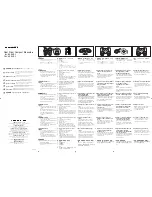
28
AGM Global Vision
2.4 OPERATION UNDER UNUSUAL CONDITIONS
2.4.1 OPERATION IN DUSTY OR SANDY AREAS
CAUTION:
Always observe the below precautions when operating in dusty or sandy areas, as use in these
types of adverse environments can cause gouges and scratches to the optical parts of the device,
as well as damage the mechanical components.
1. Verify that the sacrificial window is in place.
2. Avoid pointing the monocular into the wind unless it is absolutely necessary.
3. Keep the carrying case closed unless removing or replacing items.
4. Ensure that all dust and sand is removed from the PVS-14 and carrying case after operation.
2.4.2 OPERATION IN RAINY OR HUMID CONDITIONS
CAUTION:
Always observe the below precautions when using the device in rainy or humid environments, as
these adverse conditions can cause corrosion and deterioration.
1. Install the demist shield (Paragraph 2.2.4).
2. Keep the carrying case and the shipping and storage case closed unless removing or replacing
items.
3. Always dry the monocular, mounts, and accessories after exposure to rain or high humidity, and
before storage. This will prevent mildew from forming in the case.
4. Do not store the monocular in a wet carrying case or in a wet shipping and storage case.
2.4.3 OPERATION IN SALT WATER AREAS
After exposure to salt water, clean the PVS-14 (Paragraph 3.4.1).
2.4.4. OPERATION IN NUCLEAR, BIOLOGICAL, AND CHEMICAL ENVIRONMENTS
WARNING:
Never reuse an eyecup or eye guard that has been contaminated by hazardous materials or
environments. Contaminated eyecups and eye guards must be replaced.
1. Decontamination – Always wear a protective mask when decontaminating the PVS-14.
2. Hardness – Do not use the DS-2 to decontaminate the PVS-14. To decontaminate the device,
use 5% sodium hypochlorite and rinse with hot (70°C/158°F), soapy water.








































